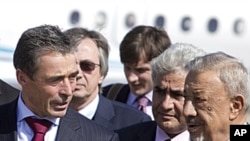Libya's National Transitional Council has elected Abdel-Rahim el-Keeb as the country's new interim prime minister, hours before NATO ended its Libya mission.
The Tripoli native won with a slim majority Monday, gaining 26 of the 51 National Transitional Council members' votes. El-Keeb is a U.S.-educated electrical engineer who earned his doctorate at North Carolina State University.
He is tasked with forming a new government that will pave the way for national elections.
The vote came shortly before NATO ended its Libya mission at midnight Libyan time, concluding its air campaign to protect civilians under a U.N. Security Council resolution.
NATO Secretary-General Anders Fogh Rasmussen hailed the seven-month bombing campaign during a visit to Tripoli Monday. He said he is "proud of the part NATO played" in helping Libyan transitional forces drive Moammar Gadhafi from power.
Rasmussen said the alliance acted to protect the Libyan people and "together we succeeded." He called Libya "finally free," praising its people for having transformed the country and helping to change the region.
The NATO chief was in the Libyan capital for talks with the National Transitional Council, including chairman Mustafa Abdel Jalil. Rasmussen said discussions will focus on Libya's expectations regarding possible future NATO assistance and the country's roadmap for a transition to democratic rule.
NATO formally decided to halt the mission after the U.N. canceled the mandate last week, though Libya's transitional leaders had urged NATO to continue because of security concerns.
U.S. Secretary of State Hillary Clinton says Libya faces a "huge challenge" to unify the country, and that leaders have a complicated political task ahead of them. But she told The Washington Post the United States and other countries have offered assistance, and will help Libya in any way they can.
|
VOA's Susan Yackee discusses the development with correspondent Margaret Besheer at UN headquarters in New York:
|
Meanwhile, Libya's outgoing provisional prime minister, Mahmoud Jibril, Sunday said he could confirm the presence of chemical weapons in the country. He did not provide details on weapons sites, but said representatives from international organizations are set to arrive later this week to deal with the issue.
Last week, the top U.N. envoy to Libya, Ian Martin, told the Security Council that previously undeclared chemical weapons sites had been found in Libya.
Provisional leaders declared the country liberated from the 42-year rule of Moammar Gadhafi during a ceremony on October 23. Officials have said they plan to form a new interim government within a month, followed by elections for a constitutional assembly within eight months. Parliamentary and presidential elections would be held within a year after that.
Some information for this report was provided by AFP, AP and Reuters.




